ARGUMENT Essay Rubric
英语倡仪书的格式和范文

英语倡仪书的格式和范文全文共3篇示例,供读者参考篇1A Student's Manifesto for Mastering the English LanguageMy fellow students, lend me your ears! The path to a brighter future lies in our grasp, and that path is paved with the mastery of the English language. We stand at a crossroads, where our choices will shape our destinies. Will we cling to the comforts of our native tongues, or will we boldly embrace the language that unlocks a world of opportunities?English is not merely a means of communication; it is the key that opens doors to countless realms of knowledge, culture, and progress. In an increasingly globalized world, proficiency in English has become a currency more valuable than gold. It is the lingua franca of diplomacy, business, and academia, transcending borders and uniting nations.Let us cast our minds back to the words of Nelson Mandela, who said, "If you talk to a man in a language he understands, that goes to his head. If you talk to him in his language, that goes to his heart." While our native languages may speak to our hearts,English will grant us the power to be heard and understood by the world.Imagine the possibilities that await us when we wield the English language with fluency and confidence. We will no longer be mere spectators in the theater of global discourse; instead, we will take center stage, our voices amplified and our ideas echoing across continents.Consider the realm of academia, where the vast majority of scholarly literature is published in English. By mastering this language, we unlock a treasure trove of knowledge, enabling us to engage with the greatest minds of our time and contribute to the ever-expanding frontiers of human understanding.In the realm of business, English is the currency of commerce, the language that transcends borders and facilitates international trade. With English as our ally, we become global citizens, capable of navigating the intricate web of multinational corporations and forging partnerships that span oceans.But our aspirations extend far beyond the realms of academia and business. English is the language of diplomacy, the tongue that fosters understanding and paves the way for peace. By embracing this language, we become ambassadors ofgoodwill, capable of bridging cultural divides and fostering unity among nations.Let us not forget the richness of English literature, a tapestry woven with the threads of Shakespeare, Austen, and Hemingway. By mastering this language, we gain access to a world of storytelling that transcends time and space, allowing us to explore the depths of human emotion and experience.Yet, our journey towards English proficiency is not without its challenges. We must be prepared to confront the obstacles that lie ahead, to embrace the struggles and persist in the face of adversity. Like a sculptor chiseling away at a block of marble, we must chip away at our weaknesses, refining our grammar, expanding our vocabulary, and honing our pronunciation.Let us draw inspiration from the words of Nelson Mandela once more, who proclaimed, "Education is the most powerful weapon which you can use to change the world." By arming ourselves with the English language, we equip ourselves with a weapon of unparalleled might, one that can shatter barriers and reshape the very fabric of our existence.My fellow students, the time has come to rise to the occasion, to embrace the English language with unwavering determination and unwavering passion. Let us not be contentwith mediocrity, but strive for excellence, for it is through excellence that we will leave an indelible mark upon the world.Together, we shall embark on this journey, supporting one another, challenging one another, and lifting each other up when the path grows steep. We shall emerge as linguistic warriors, armed with the power of English and ready to conquer the challenges that await us.Let this manifesto be our rallying cry, a beacon that guides us towards a future where the English language is not a barrier but a bridge, a tool that empowers us to forge our own destinies and shape the course of history.In the immortal words of Shakespeare, "To be, or not to be, that is the question." My fellow students, let us resoundingly answer that question by choosing to be – to be masters of the English language, to be architects of our own futures, and to be the authors of a new, more interconnected, and more enlightened world.Shall we embrace this call to action? Shall we seize the day and conquer the English language? The choice is ours, and the future awaits our decision. Let us march forward, united in our resolve, and claim our rightful place among the ranks of those who shape the destiny of nations.Lend me your voices, my fellow students, and let us declare, in one resounding chorus, our unwavering commitment to mastering the English language!篇2The Grand Manifesto on English Essay WritingFellow students, lend me your ears! For too long, we have been shackled by the confines of the dreaded English essay. Prompts have constrained our voices, rubrics have limited our creativity, and archaic formatting rules have hindered our expression. But no more! Today, I bring forth a grand manifesto, a declaration of independence from the tyranny of the English essay.First, let us address the age-old adversary: thefive-paragraph format. This rigid structure, drummed into our minds since primary school, has become a straitjacket, confining our thoughts to a predetermined mold. We are told to introduce our thesis, present three supporting body paragraphs, and conclude with a pithy summary. But where is the room for nuance? Where is the space for exploration and digression?I propose we cast off the shackles of the five-paragraph prison! Let our essays flow like a mighty river, meanderingthrough valleys of thought, cascading over falls of revelation, and pooling into eddies of reflection. An essay should be a journey, not a conveyor belt.Next, we must address the scourge of the rubric. These numerical scoring guides have reduced our efforts to a mere points game, stripping away the art and passion of writing. We find ourselves tailoring our words not to convey truth, but to pander to a predetermined checklist of criteria. Thesis statement? Check. Transitions? Check. Concluding paragraph? Check. But at what cost?I say, let us burn the rubrics and write with reckless abandon! Let our pens be guided by the fire of inspiration, not the cold calculation of point scoring. An essay is not a multiple-choice test; it is a canvas upon which we paint with the colors of language.But perhaps the greatest affront to our literary souls is the tyranny of formatting rules. We are told to double-space our lines, to use Times New Roman font, to indent our paragraphs with rigid precision. These arbitrary conventions serve no higher purpose than to homogenize our work, to strip away our individuality.I call for a revolution of formatting! Let us embrace the bold and the unconventional. Single-space your lines if you desire, or triple-space them for a sense of grandeur. Experiment with fonts that reflect your personality – perhaps a whimsical script for a creative piece, or a bold sans-serif for a persuasive argument. And as for indentation, let your paragraphs breathe, or let them run together in a stream of consciousness.To illustrate the possibilities of this liberated approach, allow me to present an exemplar, a shining beacon of what our essays can become:CopyThe Unbound EssayThisflowsuninterruptedlikeariverofinkinacalligraphicmasterpiece orbetterawildfirespreadingacrossaprairieofpagesconsumingallbeforeitwit haferociouspassion.Noindentationsnorparagraphbreakstoleashitsincessantforwardm omentum.Punctuationbecomesmereroadbumpsalongthisunboundedjourn eyslowing butneverstoppingtherelentlessadvance .Font:Asymmetric_mishmash_OfVariousStyles?#Whocares?*(^Formatting^)*unleashedlikaphoenixfromitsashencage.This, my friends, is the future of the English essay. It is a defiant rejection of the confines that have bound us for too long. It is a celebration of creative expression, a testament to the limitless potential of the written word.But I do not merely preach revolution; I call for action. From this day forth, let us write as we please, unshackled by the conventions of the past. Let our essays be living, breathing entities, evolving and adapting with each stroke of the pen (or clack of the keyboard, for those so inclined).Who is to say that an essay must follow a linear narrative? Why can we not weave our thoughts into a tapestry of intertwining threads, each strand adding depth and richness to the whole? And what dictates that an essay must be bound by the constraints of language itself? Could we not incorporate visual elements, blending words and images into a harmonious symphony?The possibilities are endless, limited only by the boundaries of our imagination. So let us cast off the shackles of the past andembrace the future of the English essay. Let our voices ring out, loud and clear, unencumbered by the weight of tradition.This, fellow students, is my manifesto – a call to arms against the tyranny of the English essay as we know it. Who will join me in this revolution? Who will stand tall and declare their emancipation from the shackles of convention? The pen is mightier than the sword, and today, we take up arms against the oppressive forces that have bound us for too long.The battle lines have been drawn, and the fate of the English essay hangs in the balance. Will you be a foot soldier in the army of liberation, or will you cower in the trenches of conformity? The choice is yours, but I implore you, do not let this opportunity for literary revolution pass you by.Onward, my fellow writers! Onward to a new era of unbridled creative expression! Let our essays be the battle cry that echoes through the halls of academia, toppling the pillars of convention and ushering in a glorious new age of artistic freedom!Vive la révolution!篇3The Manifesto: A Call for Impassioned Expression in the English TongueMy fellow students, lend me your ears! For too long, we have been shackled by the constraints of rigid academic writing, bound by the fetters of dry, lifeless prose. But today, I stand before you as a champion of the manifesto – that most electrifying and emboldened form of rhetoric, a clarion call to stir the soul and awaken the dormant fires of change.What is a manifesto, you ask? It is a declaration of principles, a rallying cry that resonates with the very core of our being. A manifesto is not merely a collection of words; it is a living, breathing embodiment of our deepest convictions, our most fervent dreams, and our unwavering determination to shape the world according to our vision.Throughout history, manifestos have been the catalysts for revolutions, the sparks that ignited the flames of progress. From the fiery words of Marx and Engels that shook the foundations of capitalism to the defiant proclamations of the Surrealists, who dared to challenge the boundaries of art and reality, manifestos have been the clarion calls that have echoed through the ages, inspiring generations to come.But what, you may wonder, does a manifesto have to do with the study of the English language? My dear friends, the manifesto is the quintessential expression of the English tongue,a canvas upon which we can paint our boldest thoughts, our most impassioned beliefs, and our grandest visions for the future.Consider the words of Thomas Paine, whose "Common Sense" manifesto ignited the flames of revolution in the American colonies, inspiring a nation to rise against the shackles of oppression. His words were not mere ink upon parchment; they were a rallying cry that resonated with the very souls of those who yearned for freedom, echoing through the halls of history and forever altering the course of human events.Or ponder the timeless manifesto of Mary Wollstonecraft, whose "Vindication of the Rights of Woman" challenged the patriarchal norms of her time, demanding equality and dignity for all, regardless of gender. Her words were not merely a plea for change; they were a thunderous proclamation that shattered the shackles of oppression, paving the way for generations of women to come.It is in the manifesto that the English language truly comes alive, transcending the boundaries of mere communication and becoming a force of nature, a torrent of emotion and conviction that sweeps away the cobwebs of complacency and ignites the fires of progress.But how, you may ask, does one craft a manifesto worthy of such lofty ambitions? The answer, my friends, lies in the very essence of the English language itself.A manifesto is not a dry, academic treatise; it is a passionate outpouring of the soul, a searing indictment of the status quo, and a clarion call to action. It demands that we abandon the shackles of convention and embrace the raw, visceral power of language, unleashing a torrent of words that sear the mind and stir the heart.To craft a manifesto, one must first cultivate a deep understanding of the English language, mastering its nuances, its rhythms, and its ability to convey the most complex and nuanced of thoughts. One must become a wordsmith of the highest order, wielding language as a sculptor wields clay, shaping it into a masterpiece that resonates with the very core of human experience.Next, one must tap into the wellspring of passion that lies within, drawing forth the burning convictions that fuel our dreams and our desires for change. A manifesto is not a mere recitation of facts; it is a rallying cry that speaks to the deepest longings of the human spirit, igniting the fires of revolution and inspiring others to action.Finally, one must embrace the art of persuasion, weaving together a tapestry of words that compel the reader to not only understand but to believe, to feel the very essence of our cause coursing through their veins. A manifesto is not a lecture; it is a symphony of language, a crescendo of emotion that builds to a thunderous climax, leaving the reader forever changed, forever inspired.To illustrate the power of the manifesto, let us examine a few examples that have forever etched their place in the annals of history.First, consider the words of Martin Luther King Jr., whose "I Have a Dream" speech echoes through the ages as a manifesto for equality and justice. With a masterful command of language, King painted a vision of a world where all people, regardless of the color of their skin, could walk hand in hand, united in the pursuit of freedom and dignity."I have a dream that one day this nation will rise up and live out the true meaning of its creed: 'We hold these truths to be self-evident, that all men are created equal,'" he proclaimed, his words reverberating with the weight of centuries of struggle and injustice. "I have a dream that my four little children will one daylive in a nation where they will not be judged by the color of their skin but by the content of their character."In those words, King summoned the very essence of the English language, wielding it as a weapon against oppression, a clarion call that inspired generations to come and forever altered the course of history.Next, let us turn to the words of Emmeline Pankhurst, whose "Freedom or Death" manifesto ignited the flames of the suffragette movement, demanding the right for women to participate in the democratic process and have their voices heard."I incite this meeting to rebellion," she declared, her words echoing like thunder across the halls of history. "I incite this meeting to rebellion, not to violence, but if the government allows itself to be driven into violence, then we shall defend ourselves."With those words, Pankhurst harnessed the power of the English language, transforming it into a rallying cry for justice and equality, a call to arms that resonated with the very souls of those who yearned for change.Finally, let us examine the words of the Futurist Manifesto, penned by the Italian poet Filippo Tommaso Marinetti, whose bold proclamations challenged the very foundations of art and culture, ushering in a new era of artistic expression."We will glorify war – the world's only hygiene – militarism, patriotism, the destructive gesture of freedom-bringers, beautiful ideas worth dying for, and scorn for woman," Marinetti proclaimed, his words searing the mind with their audacity and their defiance of convention.In these words, we see the power of the manifesto to challenge the status quo, to shatter the boundaries of the accepted and the expected, and to pave the way for new horizons of thought and expression.My fellow students, it is our turn to take up the mantle of the manifesto, to harness the raw power of the English language and wield it as a force for change, for progress, and for the betterment of humanity.Whether our cause is to champion social justice, to protect the environment, or to blaze new trails in the realms of art and culture, the manifesto is our weapon, our rallying cry, and our clarion call to action.Let us embrace the manifesto as a living embodiment of our convictions, a passionate outpouring of our souls that resonates across the ages, inspiring generations to come and forever altering the course of human events.For in the manifesto, we find the true essence of the English language – a tongue of fire, a torrent of emotion, and a searing indictment of the status quo. It is in the manifesto that we can unleash the full power of our words, painting our boldest visions upon the canvas of history and forever etching our names among the ranks of those who dared to dream, to challenge, and to change the world.So let us raise our voices in a mighty chorus, a symphony of impassioned expression that echoes across the ages, inspiring generations to come and forever altering the course of human events. For in the manifesto, we find the true essence of the English language – a tongue of fire, a torrent of emotion, and a searing indictment of the status quo.My fellow students, the time has come to embrace the manifesto, to harness the raw power of language and wield it as a force for change. Let our words resonate like thunder, shaking the foundations of complacency and igniting the fires of progress. Let our manifestos be the rallying cries that inspiregenerations to come, forever etching our names among the ranks of those who dared to dream, to challenge, and to change the world.For in the manifesto, we find the true essence of the English language – a tongue of fire, a torrent of emotion, and a searing indictment of the status quo. Let us embrace it, let us wield。
persuasive-essay-rubric

Persuasive Essay RubricDirections: Create a five paragraph persuasive essay with a proper introductory paragraph, body with main points and supporting details, and a strong conclusion.Attention Catcher0------------------------1-----------------------2-----------------------3-----------------------4-----------------------5 Did not attempt to use attention catching technique Attention Catcher Present Superb Thesis0------------------------1-----------------------2-----------------------3-----------------------4-----------------------5 Not present Vague or unclear Hinted at purpose Clearly Stated Preview of Main Points0------------------------1-----------------------2-----------------------3-----------------------4-----------------------5 Not previewed Confusing or weak points Vague or unclear Strong points clearly stated First Body Paragraph0------------------------1-----------------------2-----------------------3-----------------------4-----------------------5 No point Breaks the golden rule or lacks at least 3 supporting details Clear point and good details Second Body Paragraph0------------------------1-----------------------2-----------------------3-----------------------4-----------------------5 No point Breaks the golden rule or lacks at least 3 supporting details Clear point and good details Third Body Paragraph0------------------------1-----------------------2-----------------------3-----------------------4-----------------------5 No point Breaks the golden rule or lacks at least 3 supporting details Clear point and good details Conclusion (restatement of thesis and main points)0------------------------1-----------------------2-----------------------3-----------------------4-----------------------5 Not Present Missing thesis or restatement of main points Excellent Conclusion (clinching statement)0------------------------1-----------------------2-----------------------3-----------------------4-----------------------5 Not Present Missing thesis or restatement of main points Excellent Neatness0------------------------1-----------------------2-----------------------3-----------------------4-----------------------5 Illegible Sloppy or difficult to read Presentable Beautifully DoneSome Words about Persuasive Essay Structure:If you do not have main points, your essay will not have structure. First, decide what you are writing about (this will be your thesis). Then, think of three different arguments to support your thesis. Now you can begin organizing your information underneath your three main points.Your essay will not be effective if you just start writing every argument you can think of in no particular order. You need to plan first. The time you spend planning will save you time when you are writing.Structure Chart:IntroductionAttention catcher! Thesis. Main point 1, and Main point 2, and Main point 3. Transitioning sentence.Body Paragraph #1Main point #1. Supporting details, supporting details, supporting details. Also, more supporting details.Body Paragraph #2Main point #1. Supporting details, supporting details, supporting details. Also, more supporting details.Body Paragraph #3Main point #1. Supporting details, supporting details, supporting details. Also, more supporting details.ConclusionIn conclusion, thesis. Main point one, and main point two, and main point three. Clinching Statement.I am not grading your ideas. I am grading your ability to put your ideas into a structured form. By including all of the necessary parts in the correct order, you will create writing of a higher quality than if you just throw all your ideas into an unorganized list. Readers will be able to follow your ideas and your teacher will be happy!。
10分的英语作文评分标准

10分的英语作文评分标准英文回答:10-Point English Essay Rubric.Content (2 points)。
Clearly and coherently presents a well-developed thesis statement.Provides ample evidence and examples to support the thesis.Demonstrates a comprehensive understanding of the topic.Organization (2 points)。
Uses clear and logical transitions to connect ideas.Paragraphs are well-structured and support the thesis.Follows the specified essay format.Language Use (2 points)。
Uses precise and varied vocabulary.Constructs grammatically correct and cohesive sentences.Demonstrates a strong command of the English language.Mechanics (2 points)。
Sentences are free from errors in grammar, spelling, and punctuation.Essay is presented in a neat and organized manner.Formatting and citations adhere to the specified style guide.Overall Impression (2 points)。
英语作文评分细则

英语作文评分细则Essay Grading Rubric。
Introduction:The introduction clearly states the topic and sets the tone for the rest of the essay. It should include a thesis statement that presents the main argument or purpose of the essay.Content:The content of the essay should be well-researched and provide relevant information to support the thesis statement. The arguments should be logical and well-organized, with clear transitions between paragraphs. The essay should demonstrate a deep understanding of the topic and offer insightful analysis.Organization:The essay should have a clear and logical structure, with an introduction, body paragraphs, and a conclusion. Each paragraph should focus on a single idea and support it with evidence. The essay should flow smoothly and coherently from one point to the next.Development:The essay should develop its ideas thoroughly and provide sufficient evidence to support its claims. It should avoid generalizations and unsupported assertions. The essay should also consider and respond to potential counterarguments.Clarity:The essay should be clear and easy to understand. It should use precise language and avoid unnecessary jargon or complex sentence structures. The writing should be free of spelling and grammatical errors.Style:The essay should demonstrate a strong and engaging writing style. It should use varied sentence structures and vocabulary to maintain the reader's interest. The essay should also show an awareness of audience and purpose.Conclusion:The conclusion should effectively summarize the main points of the essay and restate the thesis statement. It should leave the reader with a sense of closure and a final impression.Overall Impression:The essay should leave a strong and positive impression on the reader. It should be well-written, thoughtful, and persuasive. It should demonstrate a high level of critical thinking and analysis.Sample Essay (Fictional):Title: The Impact of Technology on Education。
英语作文议论

英语作文议论Argumentative Essay on the Topic of English Writing。
Introduction。
The ability to write effectively in English is a crucial skill in today's globalized world. As the international language of business, academia, and communication, proficiency in English writing has become increasingly important for individuals seeking to succeed in a wide range of professional and personal endeavors. This essay will explore the significance of developing strong argumentative writing skills in English, the challenges faced by non-native English speakers, and strategies for improving one's English writing abilities.The Importance of Argumentative Writing in English。
Argumentative writing is a fundamental aspect of English language proficiency, as it allows individuals toeffectively express their ideas, defend their positions, and engage in meaningful discourse. In academic and professional settings, the ability to construct well-reasoned arguments and present them in a clear and persuasive manner is highly valued.For students, the ability to write compelling argumentative essays is essential for success in higher education. Many university-level courses, particularly in the humanities and social sciences, require students to produce well-researched and logically structured argumentative papers. These assignments not only test a student's understanding of course content but also their critical thinking and communication skills.In the professional realm, the ability to write persuasive arguments is equally important. Executives, managers, and other decision-makers often need to present their ideas and proposals in a convincing manner, whether it's in the form of a business plan, a policy recommendation, or a report. Effective argumentative writing can help individuals advocate for their ideas,secure funding, or influence the decision-making process.Furthermore, the ability to engage in argumentative writing in English can open up a world of opportunities for individuals. In an increasingly globalized economy, the ability to communicate effectively in English can give non-native speakers a significant advantage in the job market, allowing them to access a wider range of career opportunities and collaborate with colleagues from diverse backgrounds.Challenges Faced by Non-Native English Speakers。
Descriptive-Essay-Rubric

Class,This essay is an opportunity to describe a person, place, or a thing in deep detail. The main goal of this essay is to give the reader your dominate impression of the person, place, or object. This dominant impression needs to be expressed clearly in the first paragraph as your paper’s thesis statement. In addition you should use as many specific sense details as possible (sight, smell, hearing, touch, taste). Your ideas need to be organized clearly, with each paragraph addressing a specific topic (the topic sentence).This essay should have 5 paragraphs: an introduction, 3 body paragraphs, and a conclusion paragraph.Your 1st draft is due next week; make sure to bring 3-4 copies of your printed paper for peer-reviews. I am also sending you the Descriptive Essay Scoring Guide for you to see how the essay will be scored.∙Choose a place to describe. This can be your favorite place, your least favorite place, a place you go often, a place where you spend a lot of your time, a place that you have only seen once, a place that you never want to return to again, a place that holds happy or sad memories for you, or a place that you dream about. It can be your bedroom, your house, your classroom, a street corner, a beach, a library, a grocery store, a park, a museum, a city, or any other place you can think of.∙Choose a person to describe. This can be a person you know well, a person you only met yesterday, a person you love, a person you despise, a person you would like to meet, or a person you hope you will never meet. It can be someone you remember fondly from childhood, someone who made you afraid, someone you had a crush on, or someone who hurt you. It can be your son, your mother, your best friend, your roommate, your next-door neighbor, an interesting stranger you saw on the bus this morning, your ideal husband or wife, the worst or best teacher you've ever had, or anyone else you can think of.∙Choose an object to describe. This can an object you see often, an object you love, an object you wish didn't exist, an object you can't live without, or an object you wish you had. I can be your most valuable possession, something you can't get rid of, something you inherited, something your boyfriend or girlfriend gave you, something you have had since you were a child, or something you have had for only a week. It can be your car, your favorite shirt, a gift your mother gave you, a painting you love, a trophy you won, or any other object you can think of.Rubentamu2012@– Ruben Gonzales (Instructor)Name_________________________________ Student ID_______________________ Intermediate Writing-School of Foreign Languages Date______________________ Descriptive Essay RubricTitle of Essay reflects content: Yes NoPeer Assessor: ______________________Simile/Metaphor/Personificaion。
英语作文阅卷仲裁 阈值
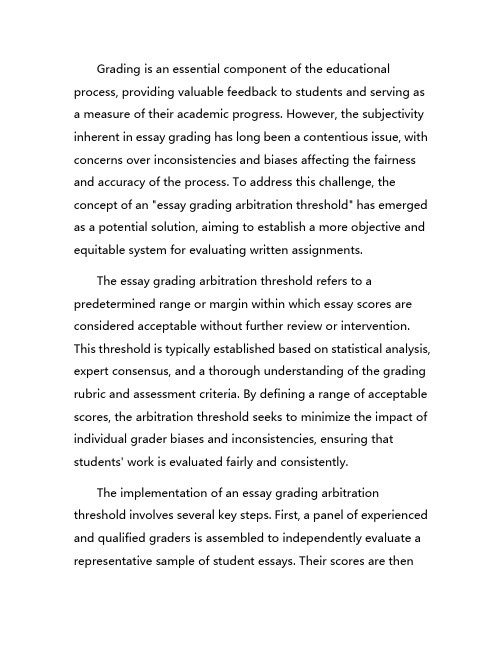
Grading is an essential component of the educational process, providing valuable feedback to students and serving as a measure of their academic progress. However, the subjectivity inherent in essay grading has long been a contentious issue, with concerns over inconsistencies and biases affecting the fairness and accuracy of the process. To address this challenge, the concept of an "essay grading arbitration threshold" has emerged as a potential solution, aiming to establish a more objective and equitable system for evaluating written assignments.The essay grading arbitration threshold refers to a predetermined range or margin within which essay scores are considered acceptable without further review or intervention. This threshold is typically established based on statistical analysis, expert consensus, and a thorough understanding of the grading rubric and assessment criteria. By defining a range of acceptable scores, the arbitration threshold seeks to minimize the impact of individual grader biases and inconsistencies, ensuring that students' work is evaluated fairly and consistently.The implementation of an essay grading arbitration threshold involves several key steps. First, a panel of experienced and qualified graders is assembled to independently evaluate a representative sample of student essays. Their scores are thenanalyzed to identify patterns, outliers, and areas of disagreement. Based on this analysis, a range of acceptable scores is determined, taking into account factors such as the complexity of the assignment, the rubric's criteria, and the expected level of student performance.Once the arbitration threshold is established, it is applied to the grading process. Essays that receive scores within the predetermined range are considered final, without further review. However, essays that fall outside of the threshold are flagged for a second round of grading by an additional grader or a panel of graders. This additional review helps to ensure that any outlier scores are carefully scrutinized and that the final grade assigned is fair and accurate.The implementation of an essay grading arbitration threshold offers several potential benefits. Firstly, it promotes consistency and fairness in the grading process by reducing the impact of individual biases and inconsistencies. By establishing a range of acceptable scores, the system recognizes that grading is a subjective process and that some variation in scores is expected. This acknowledgment helps to minimize the risk of unfair grading practices that can disadvantage certain students or groups.Secondly, the arbitration threshold can enhance the efficiency of the grading process by reducing the need for extensive re-grading or third-party reviews. Essays that fall within the acceptable range can be graded more quickly, freeing up resources for more thorough reviews of outlier cases. This efficiency can be particularly valuable in large-scale assessments or high-stakes testing scenarios, where timely and accurate grading is crucial.Furthermore, the use of an essay grading arbitration threshold can foster greater transparency and accountability in the grading process. By establishing clear criteria and thresholds, the system provides a framework for consistent and defensible grading decisions. This transparency can help to build trust among students, educators, and stakeholders, as well as facilitate constructive feedback and continuous improvement of the grading process.However, it is important to note that the implementation of an essay grading arbitration threshold is not without challenges. Determining the appropriate threshold range requires careful analysis and collaboration among subject matter experts, educators, and statisticians. Additionally, the system must be regularly reviewed and adjusted to account for changes incurricular requirements, assessment rubrics, and student populations.In conclusion, the essay grading arbitration threshold represents a promising approach to addressing the inherent subjectivity and potential biases in essay grading. By establishing a predetermined range of acceptable scores and implementing a systematic review process for outlier cases, this system aims to promote fairness, consistency, and efficiency in the evaluation of written assignments. While challenges exist in its implementation and ongoing maintenance, the potential benefits of this approach warrant further exploration and refinement as educators and policymakers strive to create more equitable and effective assessment practices.。
英语作文200字左右评分标准
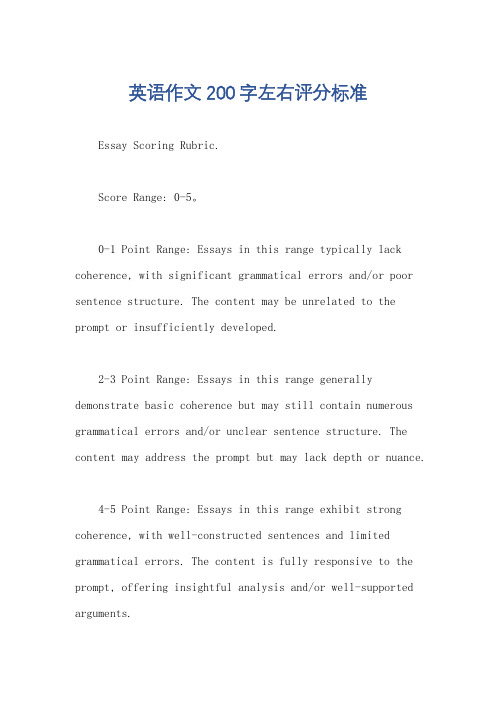
英语作文200字左右评分标准Essay Scoring Rubric.Score Range: 0-5。
0-1 Point Range: Essays in this range typically lack coherence, with significant grammatical errors and/or poor sentence structure. The content may be unrelated to the prompt or insufficiently developed.2-3 Point Range: Essays in this range generally demonstrate basic coherence but may still contain numerous grammatical errors and/or unclear sentence structure. The content may address the prompt but may lack depth or nuance.4-5 Point Range: Essays in this range exhibit strong coherence, with well-constructed sentences and limited grammatical errors. The content is fully responsive to the prompt, offering insightful analysis and/or well-supported arguments.Additional Considerations:Vocabulary: Use of advanced vocabulary is encouraged but not essential. The focus is on clear and effective communication.Creativity: Unique perspectives and original thinking are valued, but they must be supported with logical arguments and evidence.Structure: A clear introduction, body paragraphs, and conclusion are expected. Paragraphs should be organized logically and transition smoothly.Mechanics: Spelling, punctuation, and formatting should be accurate and consistent.Note: This rubric is general and may be adjusted based on specific assignment requirements or institutional standards.。
批判性思维论证作文英语
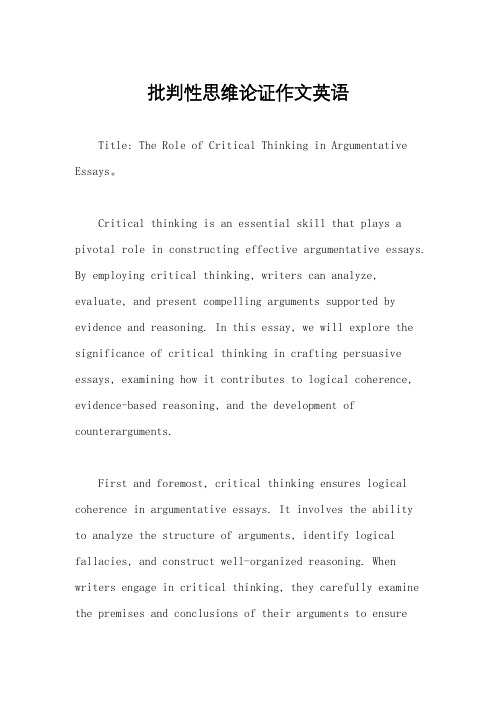
批判性思维论证作文英语Title: The Role of Critical Thinking in Argumentative Essays。
Critical thinking is an essential skill that plays a pivotal role in constructing effective argumentative essays. By employing critical thinking, writers can analyze, evaluate, and present compelling arguments supported by evidence and reasoning. In this essay, we will explore the significance of critical thinking in crafting persuasive essays, examining how it contributes to logical coherence, evidence-based reasoning, and the development of counterarguments.First and foremost, critical thinking ensures logical coherence in argumentative essays. It involves the abilityto analyze the structure of arguments, identify logical fallacies, and construct well-organized reasoning. When writers engage in critical thinking, they carefully examine the premises and conclusions of their arguments to ensurethat they follow a rational sequence. This process helps maintain the coherence of the essay, allowing readers to follow the line of reasoning without encountering inconsistencies or contradictions.Moreover, critical thinking facilitates evidence-based reasoning by encouraging writers to support their claims with relevant evidence. Instead of relying solely on personal opinions or unsupported assertions, critical thinkers seek out credible sources and empirical data to bolster their arguments. By critically evaluating the quality and relevance of evidence, writers can strengthen the persuasiveness of their essays and enhance their credibility as informed commentators on the topic at hand.Furthermore, critical thinking involves the skill of anticipating and addressing counterarguments. Rather than presenting a one-sided perspective, critical thinkers acknowledge opposing viewpoints and engage with them thoughtfully. This process not only demonstrates intellectual honesty but also strengthens the overall argument by preemptively addressing potential objections.By considering alternative perspectives and presenting reasoned responses to counterarguments, writers can build a more robust and persuasive case for their position.Additionally, critical thinking encourages intellectual humility and openness to revision. Effective argumentative essays are not static declarations of truth but dynamic engagements with complex issues. Through critical thinking, writers remain receptive to new evidence, alternative interpretations, and evolving understandings of the topic. This willingness to reconsider one's own position in lightof new information enhances the intellectual rigor of the essay and fosters a deeper engagement with the subject matter.In conclusion, critical thinking is indispensable inthe construction of persuasive argumentative essays. By promoting logical coherence, evidence-based reasoning, engagement with counterarguments, and intellectual humility, critical thinking elevates the quality and effectiveness of written arguments. As writers cultivate their critical thinking skills, they enhance their ability to craftcompelling essays that engage readers, advance understanding, and contribute meaningfully to intellectual discourse.As we reflect on the role of critical thinking in argumentative writing, it becomes evident that its application extends far beyond the confines of academic essays. In an era marked by proliferating information and competing narratives, the ability to think critically is indispensable for navigating complex issues, evaluating conflicting claims, and making informed decisions. Whether in the realm of academia, public discourse, or everyday life, the cultivation of critical thinking skills is essential for fostering intellectual rigor, promoting informed citizenship, and advancing the pursuit of truth.。
找到一个好办法作文 评分细则
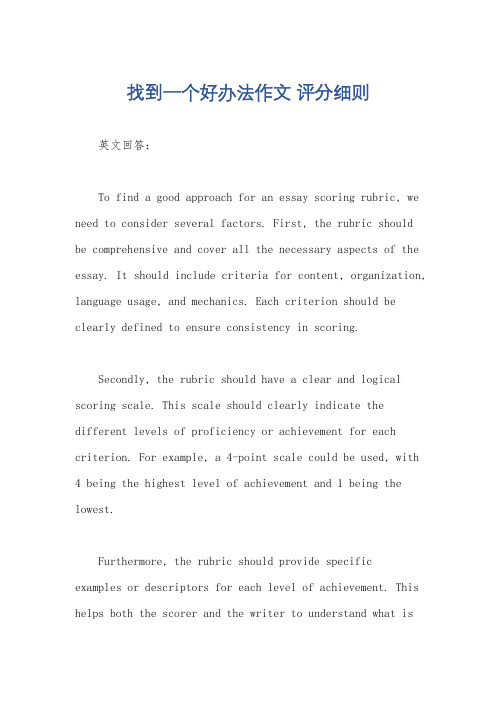
找到一个好办法作文评分细则英文回答:To find a good approach for an essay scoring rubric, we need to consider several factors. First, the rubric should be comprehensive and cover all the necessary aspects of the essay. It should include criteria for content, organization, language usage, and mechanics. Each criterion should be clearly defined to ensure consistency in scoring.Secondly, the rubric should have a clear and logical scoring scale. This scale should clearly indicate the different levels of proficiency or achievement for each criterion. For example, a 4-point scale could be used, with 4 being the highest level of achievement and 1 being the lowest.Furthermore, the rubric should provide specific examples or descriptors for each level of achievement. This helps both the scorer and the writer to understand what isexpected at each level. For instance, for the criterion of language usage, descriptors could include "demonstrates a wide range of vocabulary and accurate grammar" for the highest level, and "uses limited vocabulary and has frequent grammatical errors" for the lowest level.In addition, the rubric should be flexible enough to accommodate different types of essays. It should be adaptable to different genres, such as argumentative, descriptive, or narrative essays. This ensures that the rubric can be used for a variety of writing tasks.Lastly, the rubric should be fair and unbiased. It should not favor any particular writing style or perspective. It should focus on objective criteria rather than subjective opinions. This helps to ensure that all essays are evaluated fairly and consistently.中文回答:找到一个好的作文评分细则需要考虑几个因素。
英语反驳论文作文

英语反驳论文作文Introduction:The art of crafting a compelling argumentative essay lies in the ability to present a well-structured argument that not only states your position but also effectively refutes opposing viewpoints. This essay will delve into the essential elements of an argumentative essay, providing insights into how to construct a persuasive narrative that stands up to scrutiny.Body Paragraphs:1. Understanding the Topic and Audience:- Begin by thoroughly understanding the topic and the various perspectives surrounding it.- Consider the audience's potential biases and knowledge level to tailor your argument accordingly.2. Developing a Clear Thesis Statement:- Your thesis should be a clear, concise statement that presents your stance on the issue.- It should guide the reader through the logic of your argument and set the stage for the points you will discuss.3. Presenting Your Main Arguments:- Organize your main arguments in a logical order, with each paragraph focusing on a single point.- Use evidence such as facts, statistics, and crediblesources to support your claims.4. Refuting Counterarguments:- Anticipate potential counterarguments and address them within your essay.- Provide evidence and logical reasoning to debunk these opposing views, thereby strengthening your own argument.5. Using Logical Fallacies to Your Advantage:- Be aware of common logical fallacies and avoid them in your own argument.- Identify and expose fallacies in opposing arguments to demonstrate the weaknesses in their reasoning.6. Structuring Your Essay:- Follow a clear structure that includes an introduction, body paragraphs for each main point and counterargument, and a conclusion.- Ensure smooth transitions between paragraphs to maintain the flow of your argument.7. Concluding Your Argument:- Summarize your main points and restate your thesis in the conclusion.- Leave the reader with a strong final impression that reinforces your argument's validity.Conclusion:An argumentative essay is not just an exercise in expressing your opinion; it's a rigorous examination of an issue from multiple angles. By presenting a well-reasoned argument thatanticipates and counters opposing viewpoints, you can write an essay that is not only persuasive but also intellectually satisfying. Remember, the goal is not to win an argument but to contribute to a deeper understanding of the topic at hand.。
argumentation(2)
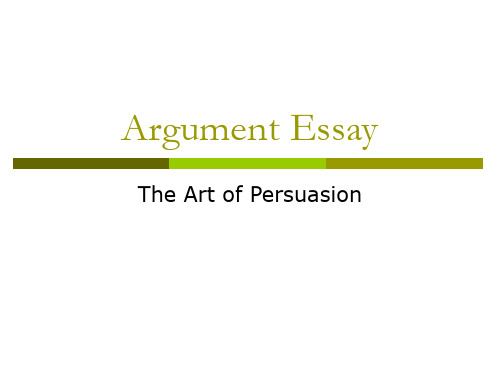
The Art of Persuasion
Arguable or Not Arguable?
Marijuana should be legalized.
Arguable Smoking is harmful to people’s health. Not Arguable
Use signal words and phrases such as Admittedly, While it is true that etc.
Offer refutation for claims which can be countered
Use signal words and phrases such as It has been argued, However etc.
Ethos-ethical appeal According to Aristotle--the credibility or trustworthiness that the author establishes in his writing
Pathos-Emotional appeal Persuades the audience by using emotions
Sample Argument Essay
Read the annotated essay on the next slide and review the following:
attention getter organization antithesis—con how author refutes the con connective words—transitions development of arguments slippery slope metaphor conclusion
浙江学位英语三级作文评分标准
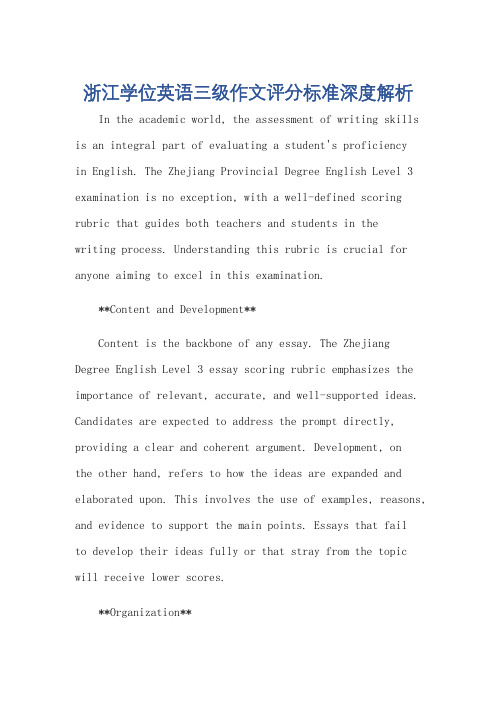
浙江学位英语三级作文评分标准深度解析In the academic world, the assessment of writing skills is an integral part of evaluating a student's proficiencyin English. The Zhejiang Provincial Degree English Level 3 examination is no exception, with a well-defined scoring rubric that guides both teachers and students in thewriting process. Understanding this rubric is crucial for anyone aiming to excel in this examination.**Content and Development**Content is the backbone of any essay. The Zhejiang Degree English Level 3 essay scoring rubric emphasizes the importance of relevant, accurate, and well-supported ideas. Candidates are expected to address the prompt directly, providing a clear and coherent argument. Development, onthe other hand, refers to how the ideas are expanded and elaborated upon. This involves the use of examples, reasons, and evidence to support the main points. Essays that failto develop their ideas fully or that stray from the topic will receive lower scores.**Organization**Organization refers to the logical flow of ideas within an essay. A well-organized essay has a clear introduction, body paragraphs that build upon each other, and a conclusion that ties everything together. The Zhejiang Degree English Level 3 essay scoring rubric rewards essays that are easy to follow and that maintain a logical thread throughout. Essays that are disorganized or lack coherence will receive lower scores.**Language Use**Language use is another crucial aspect of the Zhejiang Degree English Level 3 essay scoring rubric. This includes the use of vocabulary, sentence structure, and grammar. Candidates are expected to use a range of vocabulary appropriately, construct complex sentences, and maintain correct grammar throughout their essays. Essays that are grammatically incorrect or use simple language will not score as highly as those that demonstrate a higher level of language proficiency.**Mechanics**Mechanics refer to the technical aspects of writing, such as spelling, punctuation, and formatting. While thesemay seem minor, they are actually crucial in ensuring that an essay is easy to read and understand. The Zhejiang Degree English Level 3 essay scoring rubric penalizesessays that contain spelling errors, incorrect punctuation, or inconsistent formatting. Candidates are advised to proofread their essays carefully before submitting them to avoid these common mistakes.In conclusion, the Zhejiang Degree English Level 3essay scoring rubric is a comprehensive tool that helps teachers and students alike understand the expectations of the examination. By paying attention to content, development, organization, language use, and mechanics, candidates can ensure that their essays are well-roundedand ready to score highly. With this knowledge in hand, students can confidently approach the writing section ofthe Zhejiang Degree English Level 3 examination.**浙江学位英语三级作文评分标准深度解析**在学术领域,写作技能的评估是评价学生英语熟练程度的重要组成部分。
万唯2024英语作文电子版

万唯2024英语作文电子版The digital revolution has transformed nearly every aspect of our lives, and the world of education is no exception. As we look towards the future, the Wanwei 2024 English Essay Digital Edition represents a innovative and exciting step forward in how students engage with and demonstrate their mastery of the English language.At the heart of this initiative is a recognition that the skills and knowledge required for success in the 21st century are evolving. Gone are the days when rote memorization and rigid essay formats were the primary means of assessment. Today's students must be adept at critical thinking, creative problem-solving, and effectively communicating their ideas through a variety of mediums. The Wanwei 2024 English Essay Digital Edition rises to meet these new demands.Rather than the traditional paper-based essay, students will be tasked with producing a multimedia presentation that showcases their English language proficiency. This may include written components, but will also incorporate elements such as audiorecordings, video clips, interactive graphics, and other digital assets. The goal is to allow students to leverage technology to not only demonstrate their mastery of grammar, vocabulary, and rhetoric, but also their ability to adapt their communication style to best suit the medium and intended audience.One of the key advantages of this digital format is the opportunity for greater interactivity and real-time feedback. Instructors will be able to engage with student work as it is being developed, providing guidance and suggestions that can be immediately incorporated. This iterative process mirrors the reality of how writing and communication take place in the professional world, where collaboration and revision are essential skills.Moreover, the digital platform enables novel assessment approaches that go beyond the traditional essay rubric. Instructors will be able to evaluate not just the final product, but also the student's creative process, problem-solving strategies, and ability to effectively utilize digital tools. This holistic assessment will provide a more nuanced and meaningful understanding of each student's English language proficiency.Of course, the transition to a digital essay format also presents certain challenges that will need to be addressed. Ensuring equitable access to the necessary technology and digital literacy skills, forexample, will be critical to prevent the emergence of new barriers to success. Careful consideration must also be given to preserving the integrity of the assessment process, with robust safeguards against plagiarism and other forms of academic dishonesty.Nevertheless, the potential benefits of the Wanwei 2024 English Essay Digital Edition far outweigh the obstacles. By embracing the power of technology, this initiative has the capacity to revolutionize how we evaluate and nurture English language proficiency. Students will be empowered to showcase their skills in dynamic and engaging ways, while instructors will gain deeper insights to inform more effective teaching and learning strategies.As we look ahead to the year 2024 and beyond, the Wanwei English Essay Digital Edition represents a bold and visionary step towards preparing our students for the challenges and opportunities of the future. Through this innovative assessment format, we have the chance to redefine what it means to be proficient in English, and to equip the next generation with the skills and mindset necessary to thrive in an increasingly digital and interconnected world.。
英语作文高分段
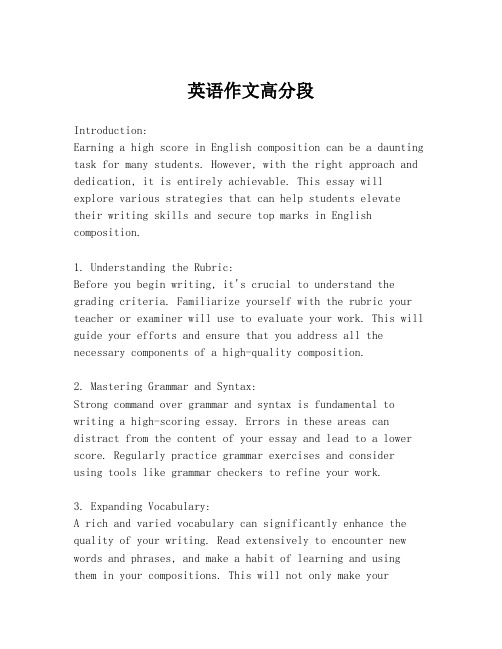
英语作文高分段Introduction:Earning a high score in English composition can be a daunting task for many students. However, with the right approach and dedication, it is entirely achievable. This essay will explore various strategies that can help students elevate their writing skills and secure top marks in English composition.1. Understanding the Rubric:Before you begin writing, it's crucial to understand the grading criteria. Familiarize yourself with the rubric your teacher or examiner will use to evaluate your work. This will guide your efforts and ensure that you address all the necessary components of a high-quality composition.2. Mastering Grammar and Syntax:Strong command over grammar and syntax is fundamental to writing a high-scoring essay. Errors in these areas can distract from the content of your essay and lead to a lower score. Regularly practice grammar exercises and consider using tools like grammar checkers to refine your work.3. Expanding Vocabulary:A rich and varied vocabulary can significantly enhance the quality of your writing. Read extensively to encounter new words and phrases, and make a habit of learning and using them in your compositions. This will not only make yourwriting more engaging but also demonstrate your language proficiency.4. Developing a Clear and Logical Structure:A well-structured essay is easier to follow and more likely to score highly. Begin with a strong thesis statement, followed by body paragraphs that each present a clear argument or point. Ensure that each paragraph is linked to the next, and conclude with a summary that reinforces your main points.5. Practicing Coherence and Cohesion:Your essay should flow smoothly from one idea to the next. Use transitional phrases and words to connect your thoughts and maintain coherence. Additionally, ensure that your sentences are coherent, with each sentence contributing to the overall argument of the paragraph.6. Enhancing Creativity and Originality:While it's important to follow the guidelines, adding a personal touch or a unique perspective can make your essay stand out. Be creative with your introductions and conclusions, and don't be afraid to express your original ideas.7. Editing and Proofreading:No matter how well you write, your first draft will likely contain errors or areas for improvement. Allocate time to revise your work, checking for grammatical mistakes, clarity of expression, and logical consistency. It's often helpful to take a break and then return to your essay with fresh eyes.8. Seeking Feedback:Before submitting your essay, consider asking a peer, a teacher, or a tutor to review it. They can provide valuable feedback that you may have overlooked and help you improve your final submission.Conclusion:Achieving a high score in English composition is about more than just following a formula; it's about demonstrating your understanding of the language and your ability to communicate effectively. By focusing on the strategies outlined above, students can significantly improve their writing skills and increase their chances of earning top marks in English composition. Remember, practice makes perfect, so keepwriting and refining your craft.。
高中英语小作文评分档次
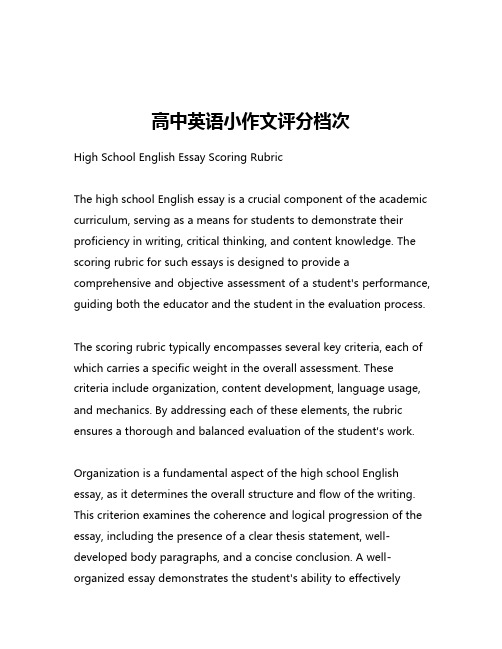
高中英语小作文评分档次High School English Essay Scoring RubricThe high school English essay is a crucial component of the academic curriculum, serving as a means for students to demonstrate their proficiency in writing, critical thinking, and content knowledge. The scoring rubric for such essays is designed to provide a comprehensive and objective assessment of a student's performance, guiding both the educator and the student in the evaluation process.The scoring rubric typically encompasses several key criteria, each of which carries a specific weight in the overall assessment. These criteria include organization, content development, language usage, and mechanics. By addressing each of these elements, the rubric ensures a thorough and balanced evaluation of the student's work.Organization is a fundamental aspect of the high school English essay, as it determines the overall structure and flow of the writing. This criterion examines the coherence and logical progression of the essay, including the presence of a clear thesis statement, well-developed body paragraphs, and a concise conclusion. A well-organized essay demonstrates the student's ability to effectivelycommunicate their ideas and guide the reader through the narrative.Content development is another essential component of the scoring rubric. This criterion evaluates the depth and breadth of thestudent's understanding of the topic, as well as their ability to provide relevant and substantial evidence to support their arguments.A high-scoring essay will exhibit a comprehensive exploration of the subject matter, drawing upon a variety of sources and incorporating thoughtful analysis and interpretation.Language usage is a crucial aspect of the scoring rubric, as it assesses the student's command of the English language. This criterion examines the student's ability to use appropriate vocabulary, sentence structure, and grammatical conventions to convey their ideas effectively. A well-written essay will showcase the student's proficiency in the English language, demonstrating their ability to communicate clearly and concisely.Mechanics, the final criterion in the scoring rubric, focuses on the technical aspects of the essay, such as spelling, punctuation, and capitalization. This element ensures that the student has adhered to the conventions of written English, contributing to the overall clarity and professionalism of the work.The scoring rubric for the high school English essay typically assignsa numerical value or letter grade to each of these criteria, with the overall score reflecting the student's overall performance. This comprehensive assessment provides valuable feedback to the student, allowing them to identify areas of strength and areas in need of improvement. By understanding the expectations set forth by the scoring rubric, students can better prepare for and excel in their high school English essay assignments.In conclusion, the high school English essay scoring rubric is a crucial tool in the assessment of student writing. By addressing the key criteria of organization, content development, language usage, and mechanics, the rubric ensures a thorough and objective evaluation of the student's work. This assessment process serves to guide both the educator and the student in the pursuit of academic excellence and the development of essential writing skills.。
英语二大作文类型分类
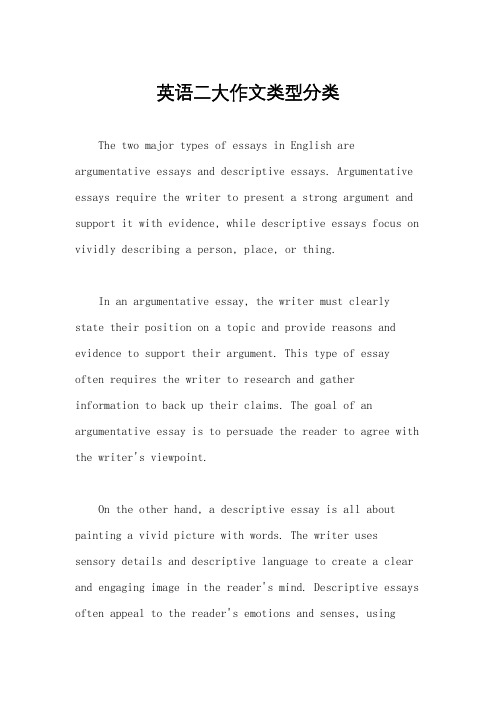
英语二大作文类型分类The two major types of essays in English are argumentative essays and descriptive essays. Argumentative essays require the writer to present a strong argument and support it with evidence, while descriptive essays focus on vividly describing a person, place, or thing.In an argumentative essay, the writer must clearly state their position on a topic and provide reasons and evidence to support their argument. This type of essay often requires the writer to research and gather information to back up their claims. The goal of an argumentative essay is to persuade the reader to agree with the writer's viewpoint.On the other hand, a descriptive essay is all about painting a vivid picture with words. The writer uses sensory details and descriptive language to create a clear and engaging image in the reader's mind. Descriptive essays often appeal to the reader's emotions and senses, usingimagery to bring a scene or subject to life.Both types of essays require strong writing skills and the ability to effectively communicate ideas. Argumentative essays demand critical thinking and the ability to construct a compelling argument, while descriptive essays rely on creativity and the skillful use of language to create a rich and immersive experience for the reader.In conclusion, argumentative essays focus on presenting a strong argument and supporting it with evidence, while descriptive essays aim to create a vivid and engaging picture with words. Both types of essays require different approaches and skills, but they both offer the opportunity for writers to express themselves and connect with their audience in meaningful ways.。
议论英语作文
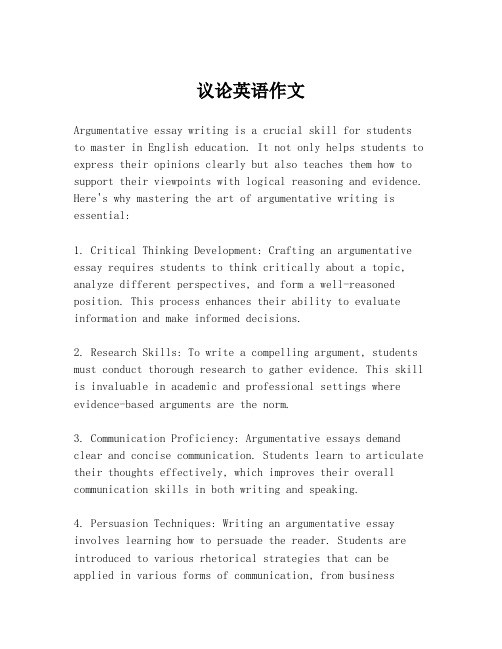
议论英语作文Argumentative essay writing is a crucial skill for students to master in English education. It not only helps students to express their opinions clearly but also teaches them how to support their viewpoints with logical reasoning and evidence. Here's why mastering the art of argumentative writing is essential:1. Critical Thinking Development: Crafting an argumentative essay requires students to think critically about a topic, analyze different perspectives, and form a well-reasoned position. This process enhances their ability to evaluate information and make informed decisions.2. Research Skills: To write a compelling argument, students must conduct thorough research to gather evidence. This skill is invaluable in academic and professional settings where evidence-based arguments are the norm.3. Communication Proficiency: Argumentative essays demand clear and concise communication. Students learn to articulate their thoughts effectively, which improves their overall communication skills in both writing and speaking.4. Persuasion Techniques: Writing an argumentative essay involves learning how to persuade the reader. Students are introduced to various rhetorical strategies that can be applied in various forms of communication, from businessproposals to public speaking.5. Cultural and Social Awareness: Engaging with controversial or complex issues often requires students to considercultural and social implications. This awareness can foster empathy and a deeper understanding of diverse viewpoints.6. Academic and Professional Preparation: Argumentative writing is a common requirement in higher education and professional environments. Preparing students for this through essay writing in school equips them with a skill that will serve them well in their future careers.7. Personal Growth: The process of writing an argumentative essay encourages self-reflection and personal growth. Students are challenged to question their own beliefs and consider alternative perspectives, leading to a more open-minded and mature outlook.In conclusion, argumentative essay writing is a multifaceted educational tool that serves to develop a range of skills beyond the ability to write well. It is a practice that should be emphasized and refined throughout English education to prepare students for the demands of critical analysis and communication in the modern world.。
- 1、下载文档前请自行甄别文档内容的完整性,平台不提供额外的编辑、内容补充、找答案等附加服务。
- 2、"仅部分预览"的文档,不可在线预览部分如存在完整性等问题,可反馈申请退款(可完整预览的文档不适用该条件!)。
- 3、如文档侵犯您的权益,请联系客服反馈,我们会尽快为您处理(人工客服工作时间:9:00-18:30)。
Thesis is very well supported with effective reasons and evidence
Thesis is supported with effective reasons and evidence
Thesis is not fully supported with effective reasons and evidence
Lacks effective reasons and evidence
Uses Academic Language
Academic language demonstrates a considerable knowledge of topic
Academic language reflects knowledge of topic
No or insignificant errors in spelling, punctuation and grammar.
A few errors are present but does not interfere with meaning.
Frequent errors distract the reader
Organizes information to support thesis
Information is partially organized
Organization is confusing
Develops and Supports Thesis with Reasons and Evidence from Multiple Sources
Concluding statement is compelling.
Concludes with a Concluding
strong
statement is
statement.
weak.
Does not have a conclusion.
Correct Conventions Support Meaning
Shows an awareness of audience by addressing counterclaims.
Does not fully address counterclaims; lacks an awareness of audience.
Does not anticipate or address countercla with understanding
Kathy Nichols, Springdale Preparatory School
strong,
clear thesis
purposeful thesis
Thesis is unclear No thesis present
Organizes Information to Support Thesis
Organization enhances readability and supports thesis
Uses transitions and varies Sentence Beginnings
Transitions or varied sentence beginnings create fluid writing within and across paragraphs.
Uses transitions to connect ideas and varies sentence beginnings
Attempts to use academic language
Does not use academic language
Shows Awareness of Audience by Addressing Counterclaims
Shows a significant awareness of audience by addressing counterclaims.
Uses minimal transitions and varied sentence beginnings.
Does not use transitions and/or does not vary sentence beginnings.
Concludes with a Strong Statement
ARGUMENT ESSAY RUBRIC: MIDDLE SCHOOL
SCORE:
NAME:
Criteria
4
3
EXCEEDED GOAL ACCOMPLISHED
GOAL
2 EMERGING
1 HASN’T YET
STARTED
Engages the Reader
Uses two engaging strategies effectively
Uses one engaging strategy effectively
Attempts to use an engaging strategy
Does not use an engaging strategy
Establishes a Clear Thesis
Establishes a
Establishes a
